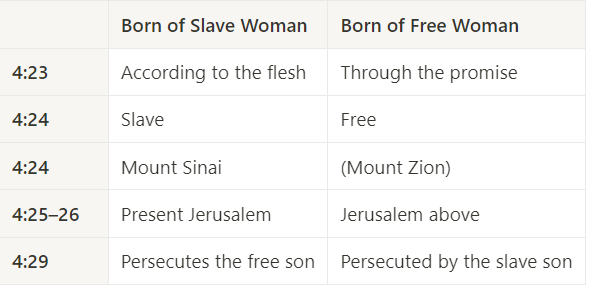During the daily Bible reading of 14 Feb, in Galatians 4:21–31, this question came up:
What is Paul talking about in the passage, what is the allegory he’s presenting?
Note: There’s a post, in Chinese, that discusses pretty much the same topic, though the initial question was a little different.
Short Answer
Paul is telling the Galatian Christians: You are the children of the Jerusalem above (heavenly), don’t go back to the present Jerusalem. In fact, you should throw out the people (the Judaizers, see below) who are trying to force you to go back to the old ways (present Jerusalem, circumcision, keeping the law, etc.)
Detailed Answer
Background
Paul started the Galatian church, but after he left, there was a group of Jews who insisted that Gentiles must first become Jews (i.e., be circumcised, follow the law, etc.) before they can join the church. This group is referred to as the Judaizers. Paul is telling this group how wrong they are, and telling the church that they should throw out the Judaizers (Gal 4:30)! With the new covenant, we only need faith in Christ Jesus in order to be right with God. The old covenant (circumcision, the law, etc.) are things of the past.
Paul then uses the story of Abraham’s two sons, Ishmael (the elder son of Abraham by his concubine Hagar), and Isaac (his younger son by his true wife Sarah). The story is in Gen 21:1–21. Abraham and Sarah were far too old to have children (even back in Gen 11:30, when we first heard of Sarah, the narrator said she was barren). God promised them a son a long time ago, but they got impatient, and Sarah gave her maid Hagar to Abraham, in order for him to have a son by Hagar (this was a perfectly normal thing to do back then). Ishmael was born, and Abraham placed all his hopes on Ishmael being the son promised by God.
However, God didn’t want Ishmael. By God’s miracle, Sarah was able to conceive, and gave birth to Isaac (she was 90 years old then, Abraham was 100). Isaac was the one chosen by God, the son of the promise. It is through Isaac that God’s plan of salvation will continue (culminating in the Messiah, Jesus). When Sarah saw Ishmael laughing at Isaac, she demanded that Abraham kick Ishmael out, saying, “for the son of this slave woman shall not be heir with my son Isaac” (Gen 21:10). Abraham was sad, because Ishmael was a teenager by then, and Abraham certainly loved him like a son. However, God told Abraham not to be upset, but to do as Sarah demanded; God will also bless Ishmael because he is Abraham’s son (Gen 21:12–13).
This story of the two women forms the background of Paul’s argument in Gal 4:21–31.
Paul’s Argument
In Gal 4:24, Paul said “this may be interpreted allegorically.” By “this”, he means the Abraham/Sarah story. Let’s see how he interprets the story.
The two woman are like the two covenants (Gal 4:24). Hagar is like Mount Sinai (the place we know from Exodus), the other he didn’t mention explicitly, but we know he’s referring to Mount Zion (Jerusalem). From Gal 4:25–27, he continues to show that the son of Hagar is like the Judaizers, while the son of Sarah is like the Galatian Christians. Then in Gal 4:28–30, he shows that just like Ishmael persecuted Isaac, the Judaizers persecuted the Galatian Christians. Finally, in Gal 4:31, he summarises to say that “we are not children of the slave but of the free woman.” The “we” here refers to the Galatian Christians (and anyone who trusts in Christ as their saviour). The following table compares the two sons:

Notice something interesting, and very disturbing to the Judaizers. The Jews have always thought of themselves as Isaac’s descendants, while the Gentiles are descendants of Ishmael. They see the Gentiles as without the law (Mount Sinai), and Jerusalem is not their city. But as we see from the table, Paul is saying that the law and Mount Sinai are from the slave woman, not the free woman, and the Gentiles that the Judaizers despised are the descendants of the free woman, and Mount Zion (Jerusalem) is theirs.
Note that in the entire passage, Paul never once mentioned Sarah (he did mention Hagar), so we know the main point isn’t about Sarah. The point is about Jerusalem: Hagar is the present Jerusalem, she is in slavery along with her children (Gal 4:25); while Sarah is the Jerusalem above, who is free (Gal 4:26). Paul is telling the Galatian Christians that if the Jerusalem above is our “mother”, why do you want to go back to be slaves with the present Jerusalem, a place that God has already forsaken?
Just like Sarah throwing out Ishmael, Paul invites the Galatian Christians to throw out the Judaizers, because the latter “shall not inherit with the son of the free woman” (Gal 4:30).
Some Notes About the Isaiah Quote
The allegory is interesting, and Paul quoted Isaiah 54:1 to prove his point. Isa 54:1 mentions a barren and desolate (divorced) woman. This woman is Israel. God has “discarded” Israel, because she was nearly always unfaithful to her covenant with God. But now she can be joyful. She can make her tent larger (Isa 54:2) because more children means a bigger tent is needed. She will “spread out to the right and to the left,” and her “children will conquer nations” (Isa 54:3). How can this be? Has she changed? Isn’t she just as unfaithful to God as before? The reason for all this happiness is not because of what Israel has done, but because of what God’s servant has done, as described in the previous passage (Isa 52:13–53:12), the fourth of the so called “Servant Songs.”[1]The other three “Servant Songs” are: Isa 42:1–4; 49:1–6; and 50:4–9.
What the servant accomplished allowed this desolate woman to once again return to God. Israel just has to trust in God, and they will have these blessings. On “this side of the cross”, we know that this servant is Jesus. He accomplished God’s plan of salvation for both the Jews and the Gentiles. Gentiles like us, who originally had no relationship to God, can now shout for joy. Because of our faith in Christ Jesus, we can become God’s children, the same as Israel.
But how can Paul equate Hagar with the present Jerusalem, and Sarah with the Jerusalem above? Isn’t this a bit arbitrary, and taking Isaiah’s prophesies out of context? Actually, Paul is following Isaiah’s lead. Let’s see what Isaiah says a few chapters earlier, in Isa 51:1–2.
Isaiah 51:1–2 (ESV)
1 “Listen to me, you who pursue righteousness,
you who seek the Lord:
look to the rock from which you were hewn,
and to the quarry from which you were dug.
2 Look to Abraham your father
and to Sarah who bore you;
for he was but one when I called him,
that I might bless him and multiply him.
Outside of Genesis, the above is the only passage in the entire Old Testament that mentioned Sarah. Sarah was just Isaac’s mother, but she has now become the “Sarah who bore you.” Who are the “you”(“you” in the Hebrew is plural) that Isaiah is referring to? They are the ones in Isa 51:1, “you who pursue righteousness, / you who seek the Lord.”[2]Note again that “you” here is plural. So Isaiah took the story of Sarah giving birth to a son, to make Sarah become the mother of a people, a people who pursue righteousness and who seek the Lord.
Paul more or less followed what Isaiah did. He sees Sarah as not just the mother of Isaac, not just the mother of Israel, but also representing the new covenant, the Jerusalem above (Gal 4:26: “But the Jerusalem above is free, and she is our mother.”)
References
Silva, Moisés. 2007. “Galatians.” In Commentary on the New Testament Use of the Old Testament, 785–810. Grand Rapids, MI; Nottingham, UK: Baker Academic; Apollos.
Wilkin, Robert N. 2010. “The Epistle of Paul the Apostle to the Galatians.” In The Grace New Testament Commentary, edited by Robert N. Wilkin. Denton, TX: Grace Evangelical Society.

Leave a Reply